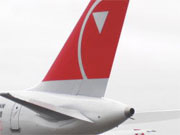Photos
Resources
| ||||||||||||||||||||||
St. Paul, Minn. — The first three weeks of the Northwest bankruptcy have not been kind to Pinnacle and Mesaba Airlines, the "regional carriers" that operate under the "Northwest Airlink" banner. Memphis-based Pinnacle and Mesaba are independent companies with a highly dependent business plan: Their schedule, revenue, and aircraft come from one place -- Northwest Airlines.
In Mesaba's case, Northwest left it with $28 million in unpaid bills, which are likely to be settled for a smaller amount sometime later in the bankruptcy process. Many of the 182 flights Northwest will drop from its schedule at the end of this month are flown by Mesaba.
Mesaba spokeswoman Elizabeth Costello says Northwest has postponed delivery of 13 new jets Mesaba was supposed to get, and wants to remove at least 45 existing planes from the fleet by January.
"In response to these developments, we're considering all options available to us -- including layoffs, severe cost reductions, and regrettably, the possibility of our own Chapter 11 filing," Costello says.
Mesaba has almost 4,000 employees nationwide, with about 1,600 in Minnesota. Costello says the company is in talks with its unions, in hopes of winning agreement on job and wage cuts that may avert bankruptcy.
Northwest says part of its bankruptcy reorganization plan includes a new "regional jet subsidiary." The airline has not elaborated on how extensive the operations of the subsidiary might be. But it raises the question of whether it would replace the flying now done by Mesaba and Pinnacle, essentially driving them out of business.
A Northwest spokesman says CEO Doug Steenland outlined the airline's position on its regional partners on the day Northwest declared bankruptcy.
"They are a part of our network, and they will continue to be a part of our network. The nature of these relationships and the service they provide will remain, for the foreseeable future, unchanged," Steenland said.
Airline industry consultant Mike Boyd thinks he knows what Northwest has in mind for its regional jet subsidiary -- and he says it doesn't look good for Mesaba.
"It's an entity that would be flying smaller aircraft, typically 70 to 100-seaters, and most of those would probably replace what Pinnacle and Mesaba are doing," says Boyd. "Mesaba has done a pretty good job, but their costs, and the cost of operating those 50-seat jets they fly, are very high."
That said, Boyd does not think Northwest intends to put Mesaba out of business, nor does he think this is a likely outcome. Boyd believes Mesaba may enter bankruptcy and emerge as a much smaller carrier, focused primarily on the smallest markets -- places like Thief River Falls, with runways that can only be used by propeller-driven aircraft.
State officials are watching closely. Steve Hurwitz, a top aviation official at the Department of Transportation, says a Mesaba bankruptcy could disrupt service to some less profitable markets, and postpone new service to others like Alexandria and Willmar.
"We're very concerned. Certainly it impacts the way people are able to fly around the state of Minnesota, service to smaller communities," says Hurwitz. "And obviously it has a potential impact on the aeronautical fund because we derive funds out of the fuel tax."
Hurwitz says taxes and fees paid by Mesaba cover a large share of the state's yearly aeronautical budget, which helps pay for things like navigational aids and safety lighting at airports in greater Minnesota.
Regardless of what happens to Mesaba, aviation consultant Mike Boyd does not think most cities Mesaba now serves have much to worry about.
"Places like Fargo, Aberdeen, Muskeegan, Saginaw -- these are part of the solution for Northwest, because they feed Northwest hubs a lot of traffic going other places," says Boyd. "There is no doubt in my mind that no matter what happens, places like Aberdeen and Fargo will still be served by something that's painted red with Northwest on the side."
In Bemidji, where Mesaba flies four times a day, airport manager Harold VanLeeuwen is confident the city will not be left hanging by Mesaba or Northwest.
"We are what's called a "profit location." It is to their benefit to continue to fly here. In today's flying business, anything profitable is worth hanging on to," says VanLeeuwen.
It's not clear just how bad things have to get to push Mesaba into bankruptcy. But the company warns of "substantial" financial losses in the final half of the year.





